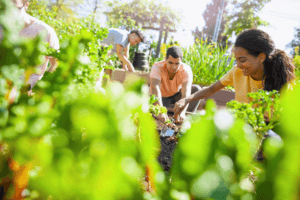Reviving Social Capital
April 11, 2024
 | By Jamie Schloegel, Chief Executive Officer |
 Community relationships can change everything
Community relationships can change everything
An equitable, sustainable, and vibrant community thrives on unity, compassion, and a sense of collective purpose. To that end, the La Crosse Community Foundation is excited to unveil a new strategic plan soon that centers on the importance of authentic, respectful, and mutually beneficial relationships – otherwise known as social capital.
Why social capital?
Social capital is about the connections between us — our shared experiences, the relationships we value, and the ideals we support. It’s what helps communities, and individuals, withstand challenges and prosper.
Think of social capital as a mix of friendships, professional relationships, and commitments to civic duties that pull us closer. Essentially, it’s the social glue that holds a community together across differences, influencing everything from how well the economy does to the well-being of each person.
“Bowling Alone,” a book by Harvard University sociologist Robert Putnam published in 2000, brought to light the diminishment of social capital. Putnam’s research made a clear connection between the decrease in community involvement and a rise in various social challenges, emphasizing the vital role these connections play in maintaining a healthy and equitable society.
Moreover, these community connections come with economic perks. According to a World Bank study, communities with strong networks often enjoy better economic situations, fewer crimes, and higher public health standards for everyone. These benefits are direct outcomes of nurturing the ties that bind us in our communities.
Connecting our communities
Building strong connections within a community leads to inclusive and equitable chances for everyone. It’s all about making sure everyone’s voice is heard and valued. Research from the University of California, Berkeley, has found that places where people from different backgrounds engage freely tend to be more welcoming and experience fewer social conflicts.
When people from diverse backgrounds come together with a shared purpose, they’re more effective at tackling local problems and standing up for the community’s needs. Another study, this one in the “Journal of Epidemiology and Community Health,” discovered that neighborhoods where people are both close-knit and ready to take action for the greater good see less crime and violence.
The concept of social capital is crucial here because it builds a network of support and shared resources across diverse groups. Strong relationships mean better information sharing, opportunities, and resources like job openings. There’s a common saying, “It’s all about who you know.” By nurturing opportunities for community members to build social capital – especially those who identify with historically disinvested groups, we widen the “who you know” network, making opportunities more equitably accessible to all.
Stay tuned
We’ll share more details about our strategic plan soon, and we hope you’ll be part of this important work. We’re grateful for your ongoing support and are excited about what we can achieve together for greater La Crosse communities.
